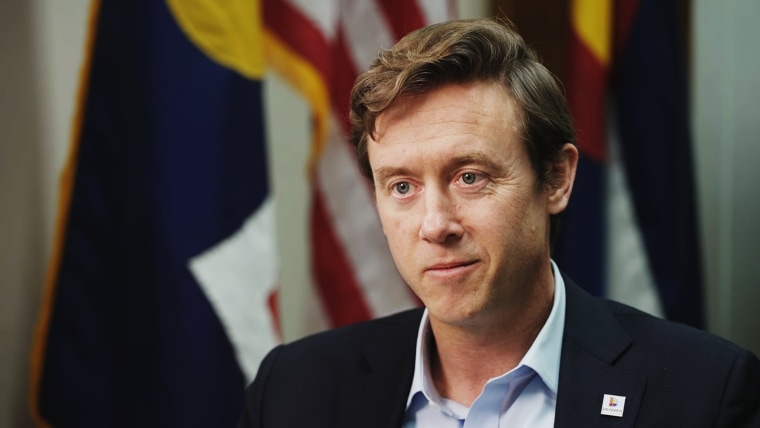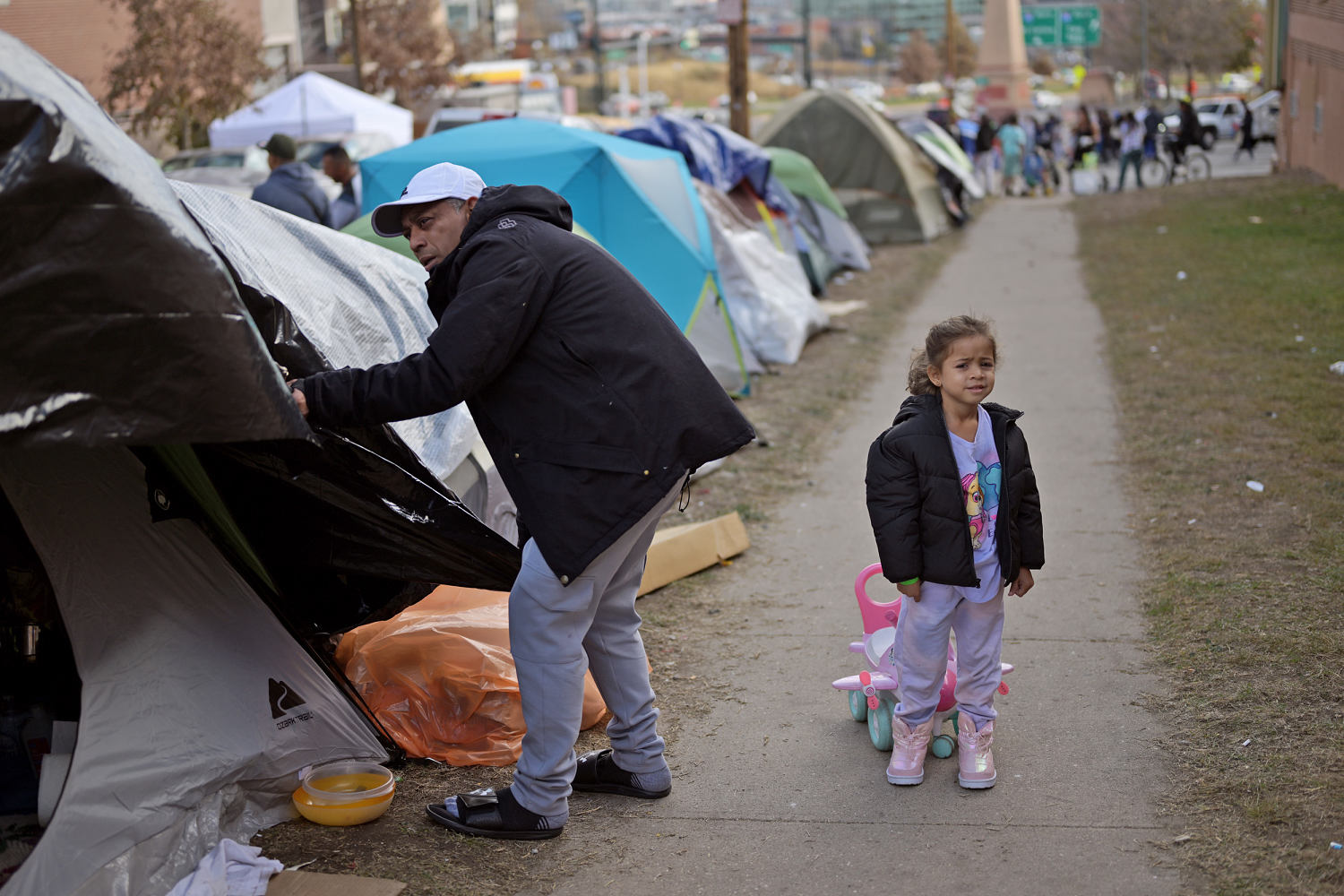As temperatures plunge in Denver, more than 2,600 migrants are in the city’s shelter system, and nearly 200 are sleeping in tent encampments on the streets. Mayor Mike Johnston has a simple solution, which is also a plea to the Biden administration: Let them work.
“Migrants right now are living in encampments in the city because they can’t find access to housing, and we know that has an impact on broader public safety and health,” Johnston said in an interview at City Hall on Tuesday. “And so we are pushing very hard to make sure folks get out of those encampments and into work. What each of those people will tell you is that the biggest thing they’re waiting on is a job to be able to get a unit to move their family into.”
More migrants are on their way to interior U.S. cities. On Tuesday, a record 10,000 migrants crossed the southern border illegally, the most ever recorded in a single day.
The Biden administration has allowed Venezuelans who arrived before Aug. 1 to apply for work authorization and temporary legal status (Venezuelans are the bulk of recent arrivals). Johnston and other Democratic mayors of major cities, however, are pushing the federal government to let more newcomers work. In October, Johnston led mayors from New York, Houston, Chicago and Los Angeles in writing a letter to the administration and later meeting with administration officials at the White House — but not President Joe Biden — to push for more and faster work authorizations.
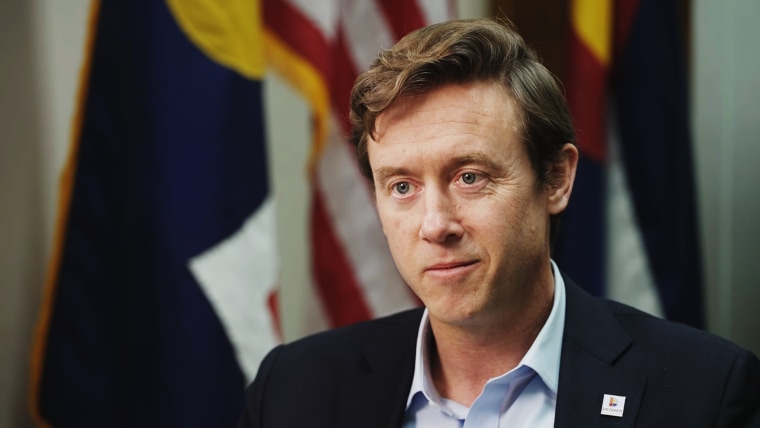
So far, the Biden administration has not changed the eligibility for work authorizations, but it has opened clinics to speed up processing times for those who qualify.
An administration official told NBC News more than 5,000 migrants have been approved to work since federally run walk-in clinics for work authorizations opened last month in Boston, Chicago and New York. Denver’s clinic is still in a pilot phase, but it is expected to ramp up soon.
A senior White House official told NBC News many cities and nonprofit groups are running their own work authorization clinics in addition to those that are federally run. The administration has told cities like Denver to take inventory of the immigrants coming to their cities so they can find out who might apply for certain benefits.
“A suggestion we have to interior cities,” the White House official said, “is to know your population, do a robust intake so you know those individuals who are coming to your city and get them immediately connected to apply for and have the ability to get a work permit.”
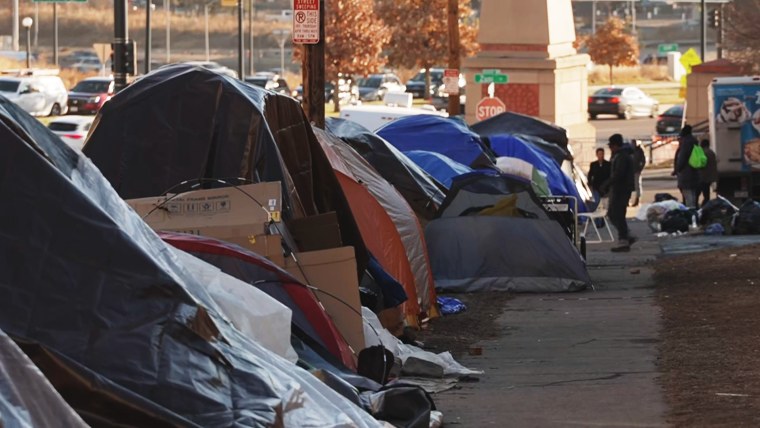
Still, more than 100,000 newly arrived migrants, including families with young children, are living without permanent housing in major cities.
Denver has seen nearly 30,000 migrants from the southern border over the past year, which Johnston said is more per capita than any other interior U.S. city. Texas Gov. Greg Abbott has bused 7,800 migrants north to Denver since May. An estimated 180 are living in encampments on streets, the mayor’s office said. And housing migrants is expensive.
Denver has spent more than $32 million so far on migrants, and it could spend as much as $100 million in the next year, according to the mayor. With less than $1 million from the federal government so far and $9 million promised by the Department of Homeland Security, Johnston said, Denver could be forced to make some tough decisions.
“We are fighting hard to avoid any cuts to core services,” he said. “But we do know these were not expenditures we had planned in the budget.”
Johnston said the city would have to look at cutting shelter for migrants to avoid cuts in other key areas.
“We’d have to look at not doing things like hotel stays and doing less safe, less supervised congregate shelter sites. We’d have to do less in the way of ongoing housing, navigation or workforce training,” he said.
‘It’s just cold’
Denver passed laws to become a sanctuary city, but unlike New York, it is not a right-to-shelter city, meaning there is no city policy theoretically compelling it to provide shelter indefinitely. Already, Denver has changed how long it will shelter migrants, cutting the time limit for single adult migrants from 21 days to 14 and increasing the time families with children can stay from 30 days to 37. In the past two weeks, as temperatures have fallen, all families with children have been given places to stay in shelters.
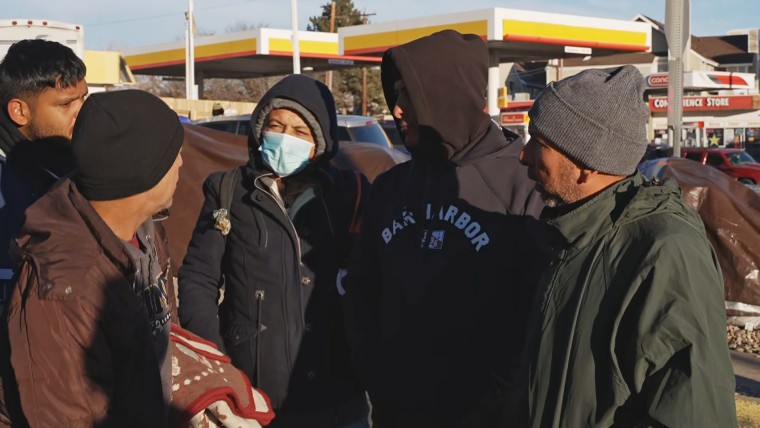
“We’re using the halls now, like the conference rooms, inside hotels so it’s large enough that you can find room for families and children to sleep there,” said Yoli Casas, the founder of the Denver nonprofit group ViVeWellness.
Casas’ organization is one of several nonprofit groups in Denver that have been helping the city manage the continuous stream of migrant arrivals who have made their way to the area for the past year through things like finding transitional housing, hosting legal clinics and coordinating community donations.
“It’s just cold. We have everybody keeping an eye out and calling us,” Casas said.
Two counties neighboring Denver have pushed back against the city’s hospitality toward migrants and have said they are not equipped to provide extra shelter space. The commissioners of Douglas County, south of Denver, passed a resolution demanding that Denver publicly renounce its sanctuary city status, which protects undocumented migrants in some ways from being handed over to federal immigration authorities.
Abe Laydon, the Republican who chairs the county commission, said it is not compassionate to welcome migrants to a cold climate like that of Colorado, where there are not enough resources to house all of the migrants arriving.
“It’s significant to me to recognize the plight of those that are traveling to Colorado. That said, the real issue is 25,000 migrants coming across the border into Colorado, because in 2017, Denver declared itself a sanctuary city,” Laydon said. “Bringing people to a cold climate without a plan is not compassionate.”
Tent city
Along the sidewalks of a residential neighborhood in Denver late Tuesday morning, migrants began setting up their encampment for the night, adding layers of tarps to keep out the below-freezing temperatures.
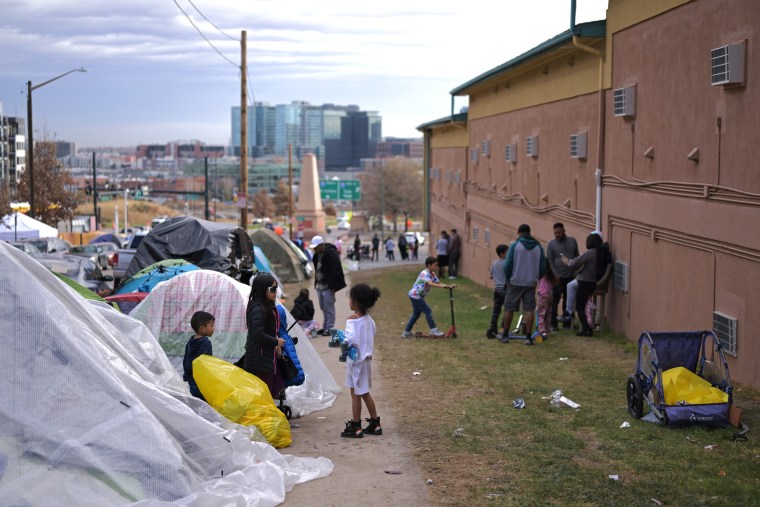
Local residents arrived to serve a warm meal to anyone gathered there. Unlike New York and Chicago, Denver has not seen mass protests against migrants arriving there. Many have banded together to provide food, tents and warm clothing for those sleeping outside.
John Schmulling lives in apartments overlooking one of the largest encampments, with about 40 to 50 tents. He said the city should do more to house the migrants, because it is not fair to the migrants or the local residents.
“It just seems pretty inconvenient for them and for us,” Schmulling said. “I think really a lot of people in this apartment complex are complaining.”
A Venezuelan woman, Genesis Montesino, arrived in Denver on Tuesday morning on a bus sent north from Texas by Abbott. Other Venezuelan migrants she was traveling with said there were three free bus options available to them: Chicago, New York and Denver. Once she reached Denver, Genesis said, she did not know where she was supposed to go to find shelter, food or transportation to any other city.
“We don’t know. We have no knowledge, direction or location,” Genesis said. “We don’t know the language.”
Yehan Ojeda, a Venezuelan man who had found shelter at a local Quality Inn, made the same case as Johnston, the mayor: a plea for work.
“We had to go through seven countries on foot, through the jungle,” he said. “We haven’t stolen. We left everything. With our hand on our heart, we came for the opportunity for the work permit, to start work, which is what we want.”
Source: | This article originally belongs to Nbcnews.com
